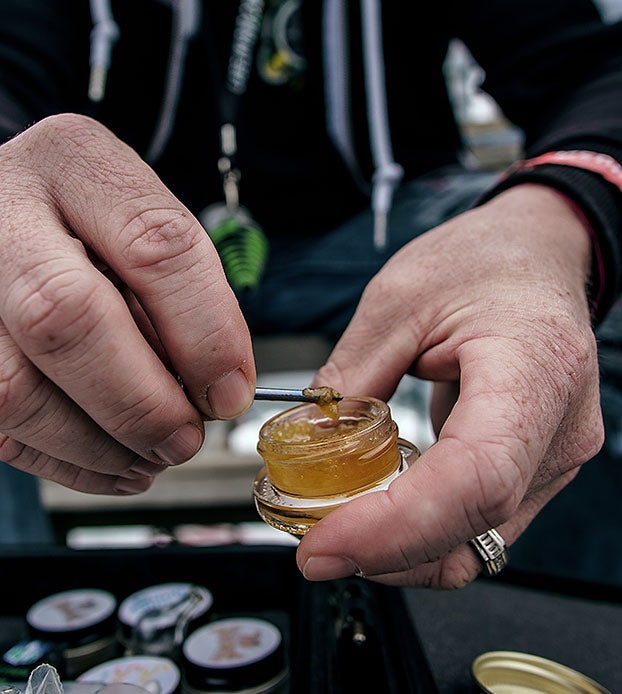Cannabis products for pets are rapidly growing in popularity around the world. Little wonder when you consider how when it comes to their pet’s health, most owners will do anything for their furry friends. But how much evidence is there that CBD for pets actually works, and is it OK to give CBD to a pet without a prescription from a vet?
What Are Cannabis Pet Products?
Humans have been taking cannabis as medicine for thousands of years. These days we know that the cannabis plant contains hundreds of cannabinoids (144 at last count), as well as other organic compounds such as terpenes and flavonoids.
When it comes to medical cannabis, most people are familiar with the cannabinoids THC and CBD. THC (Tetrahydrocannabinol) is responsible for the high associated with recreational cannabis, but also has therapeutic qualities such as reducing pain. However, THC is highly toxic to dogs and cats. So, when we talk about cannabis pet products, we are referring to cannabis products containing CBD and only trace levels of THC (less than 0.2%).
CBD (cannabidiol) is considered safe and easily tolerated in humans because it isn’t intoxicating and has relatively few side effects. CBD has also been tested on animals, but mostly on rodents in preclinical studies. While the internet abounds with anecdotal reports where animal owners say they have successfully treated their pets with cannabidiol, very few clinical studies currently exist proving CBD’s efficacy, safety, and dosing in animals like cats and dogs.
CBD And Its Effects
That said, CBD products are gaining traction for pets due to the compound’s varied therapeutic effects:
- Anti-inflammatory – CBD has been found to reduce inflammation by suppressing the immune system and binding with TRPV1 vanilloid receptors
- Anti-anxiety – CBD activates the 5HT1A serotonin receptors bringing about a calming effect
- Reduces seizures – one of the most well documented CBD therapeutic effects
- Anti-tumoral – CBD has been found to reduce tumor size and prevent the spread of cancer cells in some cancers in preclinical studies
CBD is also thought to strengthen the endocannabinoid system (ECS) – a complex communication network found in all vertebrates. Discovered fairly recently in the 1990s, the ECS comprises two key endocannabinoids (anandamide and 2-AG) activating cannabinoid (CB1 CB2) receptors in our brain, central nervous system, immune system, and organs. Endocannabinoids are produced on demand and are broken down by special enzymes (FAAH and MAGL).
The ECS works a bit like a dimmer switch, turning up or down cellular activity in order to maintain balance or homeostasis. Certain endocannabinoids also have mood-boosting and anti-inflammatory effects. We know for instance that anandamide is present in elevated levels after intense exercise. Ever wondered why dogs love running around so much?
CBD is thought to strengthen anandamide signaling by blocking FAAH, the enzyme responsible for its degradation.
All of which makes CBD a promising compound for both humans and animals. Unfortunately though, in most countries due to a lack of clinical data on humans or pets, CBD is not available as prescribed medicine.
CBD Pet Products
However, in the United States, there is a well developed CBD pet product market where a number of specially formulated pet CBD products are available such as CBD edibles (chews, treats, and biscuits) and CBD capsules or oils for dogs and cats.
Pet CBD products in the US are sold as nutritional supplements although companies are not allowed to make any medical claims.
CBD Research For Pets Shows Promise
The United States is also leading the way when it comes to clinical research on CBD for pets in key areas such as chronic pain management and epilepsy.
Using CBD oil for arthritis in elderly pets is one of the most popular reasons many owners turn to CBD and is why researchers at Cornell University decided to study CBD’s analgesic effects and safety on canine subjects. Administering 2mg of whole plant CBD oil per kilo twice a day was found to decrease pain and cause increased activity in the dogs studied. No short term side effects were observed, suggesting that CBD may be a safer alternative to the non-steroidal anti-inflammatory drugs (NSAIDs) often prescribed for pain by vets.
A second study coming out of Colorado University and headed by Dr. Stephanie McGrath, tested whether whole-plant CBD oil reduced seizures in dogs. Nine dogs were given CBD oil, and seven a placebo. The results: a staggering 89% of the dogs receiving CBD oil experienced fewer seizures. Dr. McGrath said: “This pilot study is important and it does seem like there is a positive effect from the use of CBD for dogs with epilepsy.” A further clinical trial extending the number of dogs to 60 is currently recruiting.
UK Pet Owners Must Get CBD Prescription From Vets
The British have a reputation for worshipping their pets. Little surprise then that they have become some of the greatest advocates for giving CBD to their dogs and cats. Initially, this was of little interest to the UK Veterinary Medicines Directorate (VMD)—the regulator for the manufacture, sale, prescription and use of veterinary medicines—as it viewed CBD as having little effect (beneficial or otherwise).
However, thanks to promising initial research and numerous anecdotal reports of CBD’s therapeutic benefits for animals, the organization decided to update its position. In November 2018 it announced: “The VMD considers that veterinary products containing Cannabidiol are veterinary medicines.”
This means CBD can only be administered when prescribed by a vet. Right now, there are no authorized CBD pet products, thus any vets willing to treat a pet with CBD must prescribe CBD oil meant for human use.
It would be easy to think that as a pet owner, this gives you free rein to give a few drops of your own CBD oil to your arthritic pooch. Unfortunately, this would be an offense under Regulation 8 of the VMR and is therefore illegal.
British Vet, David Harris advises that any owners currently administering CBD oil to their pet should request a prescription for CBD oil from their vet; otherwise, they are breaking the law. The same goes for anyone considering giving CBD oil for the first time.
Bottom line—if you think CBD may benefit your pet or are currently giving the cannabinoid to your dog or cat, a frank discussion with your vet is imperative. Not all vets are familiar with CBD oil, so it may be helpful to take along this article or to show them the current research explaining how CBD may be beneficial for treating animals with pain, epilepsy or anxiety.
Sign up for bi-weekly updates, packed full of cannabis education, recipes, and tips. Your inbox will love it.

 Shop
Shop Support
Support
















